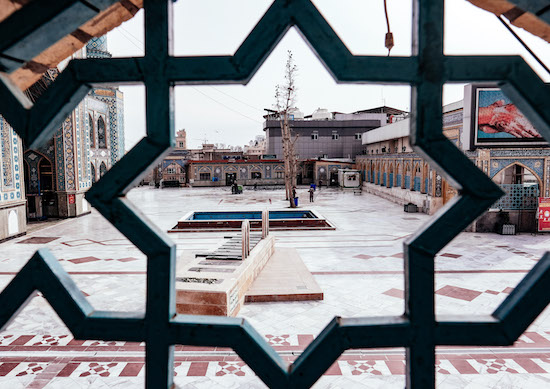In the midst of confusion and fear about the potential impacts of coronavirus on global health, financial stability and civilisation’s ability to continue functioning, mere days after Boris Johnson’s glib stammerings about the imminent deaths of our loved ones, it feels almost churlish to worry about the challenges facing underground and independent music. Yet for artists, promoters, labels and events which now face profound existential threats, these issues are far from abstract. For fans and listeners, the prospect of a world forced into abrupt silence and isolation feels no less scary.
Yesterday afternoon’s announcement that people of all ages should now avoid pubs, clubs, theatres and other communal spaces felt strikingly at odds with the bedraggled ravers returning earlier the same morning from the Bang Face Weekender in Southport, or the several thousand Stereophonics fans crammed into Cardiff’s Motorpoint Arena on Sunday night, both events which would surely have been cancelled had they happened even a day later.
The UK government’s foggy messaging and unwillingness to confront global financial interests also appears to be exacerbating this sense of disconnect. Initial responses to Johnson’s announcement have noted that, by urging customers to stay away from public premises rather than enforcing their closure, affected businesses will be unable to claim any loss of income against their insurance policies. Multinational insurers will undoubtedly be pleased, but entire industries may now face collapse as a result of Johnson choosing merely to advise rather than insist.
For Anthony Chalmers, the London-based promoter behind Baba Yaga’s Hut and Raw Power Festival, the uncertainty of the situation is overwhelming. "What are you supposed to do? Do we just not book any more shows? We all know that it’s coming, but we don’t know exactly what it’s going to look like. I’m not going to cancel shows until I have to, but there’s this fug over everything."
Chalmers is also acutely aware of the wider impacts of what essentially amounts to cancelling every music event in the UK for an unspecified period of time. "You can already see huge economic impacts from it: people aren’t going to want to invest. I’ve cut my marketing spend for advertising: it’s going to hit everything that’s paid for by advertising extremely hard". This will obviously have a knock-on impact on the music media landscape – The Quietus, for instance, is largely kept afloat by advertising for gigs and festivals.
The picture is similarly bleak for artists. Chrissy is a DJ and producer from San Francisco, one of a number of US-based performers whose European tours have been affected in the last few days. "Some colleagues have gone home; some have chosen to stay and keep playing. It seems like the ones staying are doing so because they feel unable to afford the financial hit of canceling their gig: we’re just waiting to see how things develop and if our parties go forward."
In terms of wider industry impact, though, Chrissy is just as downbeat as Chalmers: "Dance music has been in a low-level state of financial crisis since at least 2005, but this is orders of magnitude larger than that. It is unprecedented both in its scope and its suddenness. Everybody who works in this industry will be impacted. A lot of clubs will go out of business; a lot of artists will be forced to get day jobs and their musical output and gig schedules will slow accordingly."
For many in the music industry, the cancellation of South by Southwest on 6th March marked the moment when coronavirus moved from spectral threat to lived reality. Katie Malco had just announced her debut album on US indie label 6131, with a launch campaign built around a showcase gig at SXSW: having viewed this as a potential springboard for her nascent career, she’s now lost several thousand pounds with nothing to show for it.
"You don’t know what opportunities might have arisen from it, I think it’s a big question mark for everyone" she says. "For someone who’s trying to get a debut record out there, it’s even more of a challenge, because you haven’t had that exposure at even a basic level yet.
"SXSW have said they’re not refunding tickets because they’re going to reschedule, but for lots of people who’ve lost so much money trying to get there this year, I don’t know if it’s going to be affordable to go back". Malco says that if she’s invited back, she’d pay for new flights and visas the same way she funded her original plans: by loading up on more credit card debt.
In countries whose civil society infrastructure is weaker, the issues facing musicians and the music industry become infinitely more troubling. For Iranian artists, living under a repressive and opaque regime has made the process of dealing with coronavirus exponentially more difficult. Composer and producer Sote describes the situation in Tehran: "I think most people in the creative community are too stressed and emotionally down to do something at this time. Iranians have had a very rough year, and a lot of people are in a numb state. Especially now, with Persian New Year around the corner: usually the whole of Iran is getting ready to celebrate and prepare for festivities, but there is almost nothing happening. These are the times where sanctions and bullying from other countries hurt common people even more than usual.

Photo courtesy of Arash Bolouri
"Although we’re living in a very depressing and hopeless times as Iranians, overall, people have taken things in their own hands by impressively being very pro-active in their communities," he adds. "Most people are not coming out of their homes, and if they do, the majority tries to wear gloves, masks and carry disinfectants."
In discussing how to face up to these varied and overwhelming threats, there have been a few recurrent themes, including a focus on supporting the recorded output of artists and labels, and indeed those facing financial precariousness outside the music industry: a renewed sense of solidarity between artists, listeners and wider society.
As Chrissy puts it: "If you have expendable money, help others. Buy music from your fave artists’ Bandcamp pages, as this might literally be their only income during these tough months. Also consider the many non-music-industry people who are way worse off: give money to your local homeless people, or donate to a shelter or homeless charity."
Beyond the immediate need to sustain people’s income and ability to live, there are more diffuse questions about what altered form independent and underground music might take once the dust settles. For artist and thinker Mat Dryhurst, whose own SXSW show with Holly Herndon was cancelled earlier this month, the possibilities are both terrifying and open-ended.
"There seems to be no international consensus on how long this will last, and as people who essentially earn our living playing music to large rooms of people, that’s now in jeopardy," he says. "The most basic observation here is that when you stop artists’ ability to tour, to grind constantly, you see that the vast majority have no assets, no cash."
Coronavirus, Dryhurst says, has underlined just how fragile the music economy is, "at a time when tech companies in Silicon Valley are claiming that the problem of recorded music has been solved. It’s resurfaced the really obvious question of giving people money for the time involved in the art that they’ve made. Maybe this is the moment we can make a distinction between music which is financially sustainable through streaming, and everything else."
Dryhurst references a course he teaches, and a quote from a guest lecturer: "We invented money as an exchange of value, so when you value someone, you give them money". It might seem like an obvious point, but speaks to the underlying fragility of an industry in which the financial value of recorded music has been eroded over the last two decades by streaming and filesharing, while the potential to generate income from live performance has now been caught in the pincer-grip of climate crisis, increasingly restrictive border controls, and the most dangerous and destabilising pandemic of the last 100 years.
For Katie Malco, the solution is simple, and mirrors Dryhurst’s more structural analysis: "We can all be better fans". I initially mishear this as "better friends", which seems strangely apt: a renewed directness of contact between artists, industry and listeners, in which the effects of our spending are more clearly understood by all sides.
Sote, meanwhile, has a more philosophical take: "I think this is a good opportunity to slow down. Decelerate the usual life stuff that always seems so important and crucial. Now there is a good excuse to let go and work on oneself and do the things that we never had the time to do".
Dryhurst’s ultimate view is less optimistic, but still affords some hope for new ideas to emerge from this period of destabilisation and destruction. "The best thing we can take is to have this be a moment of reckoning. I think people realise now that society is only going to get crazier, and that we have to systematise our responses to that, if we don’t want the things we love to disappear".



